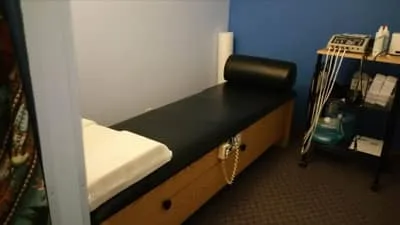
*What is IFT and how does it work?*
IFT stands for Interferential Therapy
Indications for Use of Interferential Therapy
In the USA, Interferential Therapy is approved for the symptomatic relief and management of chronic (long-term) intractable, post traumatic and post surgical pain. Many medical professionals use Interferential Therapy for its drug free, non-invasive promotion of healing and pain relief.
It has been shown that multiple daily treatments provide improved results.
Home treatment can help reduce pain, medication, and edema.
Interferential Therapy can be used to treat pain associated with:
- Back, Neck, Shoulder and Knee injuries or problems
- Fibromyalgia
- Joint injuries
- Overuse injuries and surgical procedures
- Edema, Inflammation
- Carpal Tunnel Syndrome
- Tennis Elbow
- Sports Injuries
How Interferential Therapy works
Unlike TENS, which delivers intermittent pulses to stimulate surface nerves and block the pain signal, IFT delivers a continuous stimulation deep into the affected tissue. The stimulation both blocks pain and reduces swelling and inflammation which can cause pain.
IFT achieves the deep penetration by using a 4000Hz carrier wave to overcome the skin impedance.
4 pole interferential works by putting two signals into the tissue at slightly different frequencies. Where they cross over, the two signals “interfere” to produce a lower frequency, therapeutic current. In theory, this interference current is generated in the pattern shown in the diagram. In practice, the tissues do not conduct uniformly, so the currents rarely interfere in the expected target area.
Effects of Interference Frequencies
Medical Providers believe that the low frequency interference currents have the following effects:
2Hz - Around this frequency the metencephalins are stimulated - resulting in short term pain relief.
10Hz -This frequency has a beneficial effect on the immune system and tends to make patients wakeful yet relaxed.
130Hz - This frequency stimulates the production of endorphins and results in longer term pain relief and some local anaesthesia.
1-100Hz - This frequency sweep will increase the inflammatory rate.
45 – 90Hz - This frequency sweep will depress the sympathetic nervous system so allowing increased activity of the parasympathetic system, and increase the blood supply.
Interferential Therapy as part of a treatment regime
The use of IFT should be considered a part of the whole treatment of the condition.
The whole treatment may include:
• Exercises to stretch injured muscles
• Exercises to move stiff joints
• Exercises to strengthen muscle groups to support the joints
Your medical provider will advise you accordingly.
Stiff joints are invariably painful so it is important to appreciate that gentle movement is generally better than resting.
A TENS unit, which also treats pain using electrotherapy, can be used *simultaneously *if you need extra pain control to enable you to keep the joints or muscles moving.
CAUTIONS AND WARNINGS
The same cautions apply to IFT as to TENS.
However, because of the deep penetration of the IFT signals, additional caution should be taken not to place electrodes so that the current could flow through the heart.
The maximum current density is below recommended safe levels which might affect heart rhythm, but it is best to prevent even the smallest avoidable risk.
References:
Clin J (2003) The Effects of Home Interferential Therapy on Post-Operative
Pain, Edema, and Range of Motion of the Knee. *Sport Med*. 13, 16–20.
Jarit, Mohr, Waller & Glousman
Kerlan-Jobe Orthopaedic Clinic, Los Angeles , California , U.S.A.
